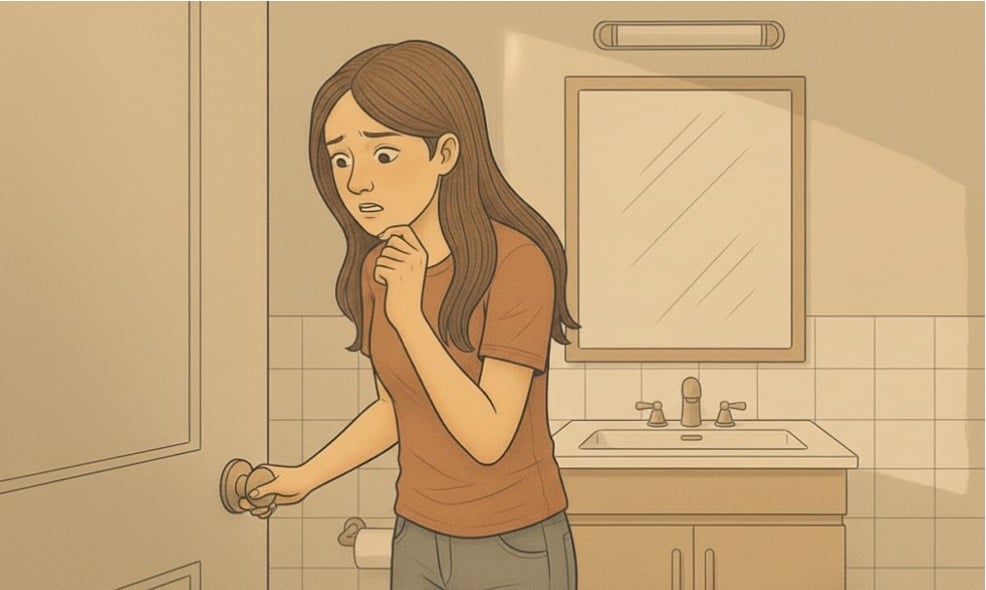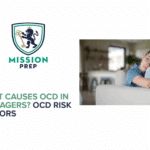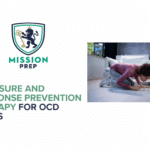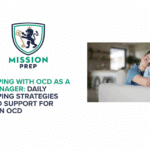Key Takeaways
- OCD is a neurobiological disorder, not a personality trait, and early recognition and treatment lead to better outcomes.
- Teen OCD often involves obsessions (intrusive thoughts) and compulsions (rituals), which can significantly impact daily life, school, and social interactions.
- Evidence-based therapies like ERP, CBT, and DBT are the most effective approaches, helping teens tolerate anxiety, manage compulsions, and build coping skills.
- Family involvement and consistent, empathetic support at home enhance treatment outcomes, while avoiding enabling avoidance behaviors strengthens progress.
- Mission Prep provides teen-centered, evidence-based OCD care, combining therapy, academic support, and family-inclusive programs to help adolescents recover effectively while staying on track in school.
OCD in Teens: What Parents Need to Know
Obsessive-Compulsive Disorder (OCD) is a neurobiological condition where intrusive thoughts, or obsessions, trigger repetitive behaviors or mental acts, called compulsions. For teens, OCD can be particularly disruptive during a life stage already filled with change and pressure. Unlike typical teenage behaviors, OCD symptoms persist, intensify over time, and interfere with daily functioning. Recognizing and addressing these symptoms early improves outcomes.
Common OCD Symptoms in Adolescents
Teen OCD can appear in many forms. Some teens have intense contamination fears, such as washing their hands excessively or avoiding common objects. Others experience intrusive thoughts about harming themselves or others, even though they would never act on them. Perfectionism and symmetry obsessions can lead to arranging objects “just right” or repeating tasks multiple times. Religious or moral worries may cause excessive concern about sinning or violating moral codes. Many teens also repeatedly seek reassurance from parents that everything is okay. These behaviors are compulsions that temporarily relieve the anxiety caused by obsessive thoughts. Teens often recognize these actions are excessive but feel powerless to stop them.
How Teen OCD Differs from Adult OCD
Adolescent OCD can differ from adult OCD in notable ways. One study examined dysfunctional beliefs and cognitive performance across symptom dimensions in childhood and adolescent OCD and found that younger individuals with OCD often have poorer insight into their symptoms and higher rates of co-occurring conditions like ADHD and disruptive disorders. By contrast, older adolescents tend to exhibit higher levels of mental compulsions. These developmental differences highlight the need for age-specific treatment approaches.
Warning Signs Your Teen Might Be Struggling
In addition to obvious rituals, subtle signs may indicate OCD, including avoiding certain situations or objects, heightened anxiety when routines are disrupted, sleep disturbances, declining academic performance, withdrawal from friends or activities, or physical signs like raw hands, skin picking, or hair pulling. Approach your teen with compassion rather than confrontation, creating a safe space for them to share their experiences, which is the first step toward getting help.
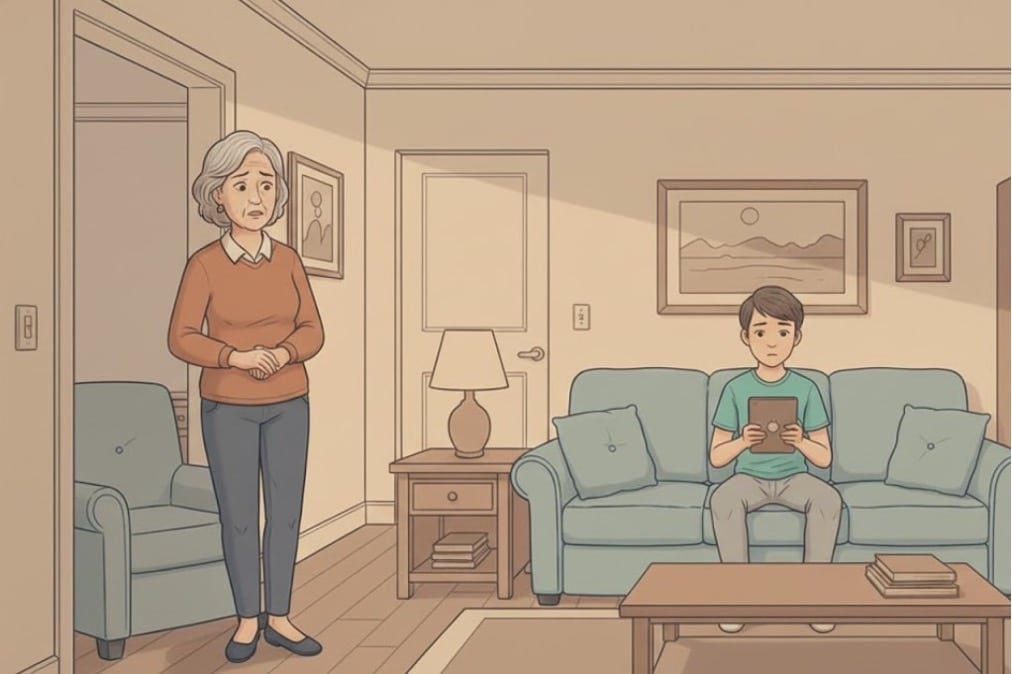
Understanding your teen’s OCD is the first step toward providing meaningful support.
Mission Prep Healthcare specializes in mental health treatment for teens aged 12-17, offering residential and outpatient programs for anxiety, depression, trauma, and mood disorders. Our therapies include CBT, DBT, EMDR, and TMS, tailored to each adolescent’s needs.
With a structured, supportive environment, we integrate academic support and family involvement to promote lasting recovery. Our goal is to help teens build resilience and regain confidence in their future.
Creating a Supportive Home Environment
The home plays a key role in either easing or intensifying OCD symptoms. While environmental changes alone won’t eliminate OCD, creating a calm, predictable space can support your teen’s recovery. OCD behaviors aren’t choices, but they’re symptoms of a neurobiological condition. Strive for balance: reasonable routines provide security, but excessive rigidity can reinforce OCD patterns. Respect your teen’s personal space and autonomy while encouraging healthy habits.
Talk About OCD Without Shame or Judgment
The way you discuss OCD matters. Avoid phrases like “just stop” or “that’s crazy,” which increase shame and isolation. Use a non-judgmental, matter-of-fact tone, and educate your teen to show that OCD is understood by professionals. Respond to disclosures with validation, not dismissal or endless reassurance. Simple statements like “I can see this is really hard for you” acknowledge their struggle without feeding OCD. Sharing stories or articles about others with OCD can also open conversations naturally.
Maintain Consistent Routines and Expectations
Predictable family routines, meal times, sleep schedules, and activities offer stability and reduce anxiety. Be clear about non-negotiable rules while showing flexibility in less essential areas. Include your teen in family life even when OCD makes participation challenging, allowing extra time or minor adjustments as needed. Maintaining normalcy reinforces that OCD doesn’t define your teen or your family.
Set Healthy Boundaries Around OCD Behaviors
Firm but compassionate boundaries prevent OCD from dominating family life while teaching coping skills. Work with a therapist to identify which accommodations help and which reinforce the disorder. Be consistent, even when your teen is distressed, acknowledging their feelings while maintaining limits. Short-term discomfort often leads to long-term improvement when guided by a professional.
Don’t Enable Avoidance Behaviors
Avoidance offers immediate relief but strengthens OCD over time. Notice when you’re helping your teen avoid triggers, and gradually support them in facing fears using therapist-recommended strategies like coping statements or breathing techniques. Celebrate efforts and small victories; the goal is not to eliminate anxiety, but to function effectively despite it.
Effective Communication Strategies
How you communicate with your teen about OCD can strongly influence recovery and your relationship. Open, empathetic communication builds trust and supports progress, while criticism or frustration can make symptoms worse. Parents often need to learn new ways of responding to difficult behaviors with patience and understanding.
Start Conversations Without Triggering Defensiveness
Approach discussions with curiosity, not accusation. Ask gentle, open-ended questions like, “I’ve noticed you’ve been washing your hands a lot, what’s that like for you?” Choose calm, low-stress moments rather than addressing concerns during rituals or tense times. Use “I” statements to express concern without blame, such as, “I’ve noticed you seem exhausted from checking your homework.” Give your teen space to respond, remembering that OCD distorts thinking, what feels irrational to you may feel absolutely necessary to them.
Validate Feelings Without Reinforcing OCD Thoughts
Acknowledge your teen’s emotions without confirming OCD beliefs. You might say, “I can see you’re really anxious right now,” rather than agreeing that something is contaminated. Avoid offering endless reassurance, which can feed the OCD cycle. Instead, redirect them to coping tools: “I know you want me to tell you everything’s fine, but let’s try one of your strategies instead.” This shows empathy while supporting treatment progress.
Help Your Teen See OCD as Separate from Themselves
Encourage your teen to view OCD as something outside themselves. Many therapists suggest giving it a nickname so intrusive thoughts become “OCD talking,” not a reflection of who they are. Use language that separates them from the disorder: “Is that your thought, or is OCD trying to trick you?” to create distance and empowerment. Reinforce their strengths, values, and goals beyond OCD, reminding them they are defined by their resilience and character, not their condition.
When to Seek Professional Help
While parental support is vital, professional treatment is essential for teens with OCD. Evidence-based therapies can greatly reduce symptoms and improve quality of life, but many families delay seeking help. Early intervention leads to better outcomes, so acting quickly is one of the most important steps you can take.
Signs Your Teen Needs Immediate Support
Seek help if OCD rituals take more than an hour a day or interfere with school, sleep, or social life. Academic decline, social withdrawal, or hopelessness signal the need for professional care. Physical problems like raw or infected skin from excessive washing, refusal to attend school, or signs of depression, anxiety, or substance use also require attention.
Don’t wait for symptoms to fade on their own; OCD rarely improves without intervention. If your teen expresses thoughts of self-harm or suicide, treat it as an emergency and seek immediate help from crisis services or emergency care. Reaching out isn’t a sign of failure, but it’s a critical step toward recovery.
Treatment Options That Actually Work
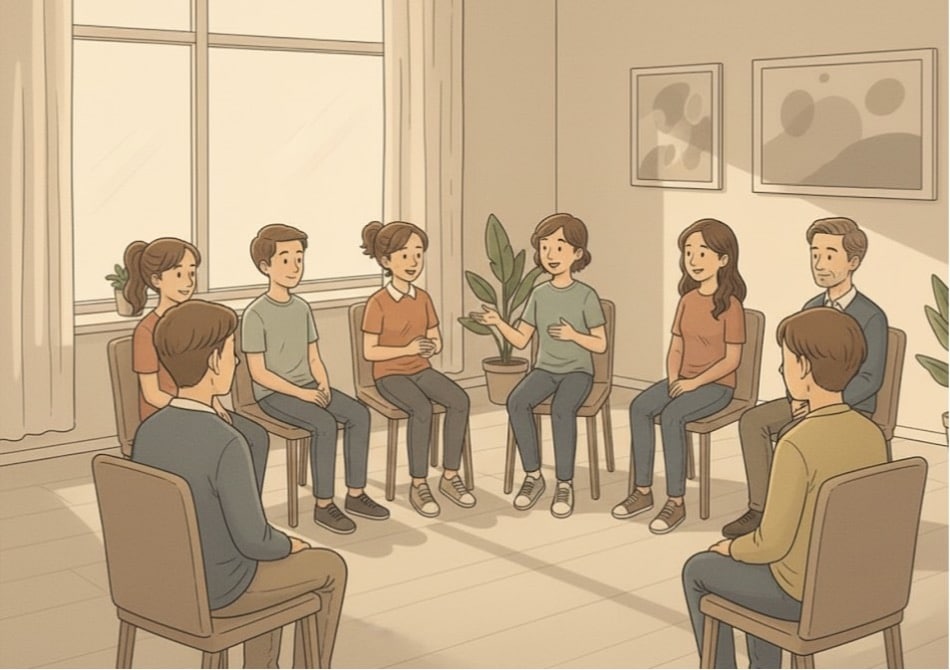
Connecting with peers in therapy or support groups helps teens feel less isolated.
Evidence consistently shows that specific, evidence-based therapies are the most effective approach for teen OCD. With proper treatment, most teens see significant symptom reduction, even if occasional OCD tendencies resurface during stressful periods. Understanding these therapies helps parents advocate effectively and set realistic expectations for recovery.
Exposure and Response Prevention (ERP) Therapy
ERP, a specialized form of cognitive-behavioral therapy (CBT), is considered the first-line treatment for adolescent OCD. It involves gradually exposing teens to situations that trigger obsessive thoughts while helping them resist performing compulsions. A 2023 randomized controlled trial published in ScienceDirect compared ERP to a stress management therapy (SMT) control condition for adolescents and adults with OCD. The study found that ERP led to greater reductions in OCD symptoms compared to SMT, indicating that ERP is an effective treatment for adolescents with OCD
Cognitive and Dialectical Behavioral Therapies (CBT & DBT)
CBT techniques help teens recognize and reframe distorted thoughts, providing practical strategies to reduce compulsions. DBT can also be beneficial, particularly for managing intense emotions and distress that often accompany OCD. Both approaches equip teens with coping skills to face triggers, tolerate discomfort, and manage anxiety without relying on compulsions.
Combination and Family Approaches
Research shows that therapy is most effective when combined with strong family support. Parents who understand how to reinforce ERP exercises and respond consistently at home help teens make faster, more sustainable progress. Family involvement, parent training, or guided family therapy sessions can ensure that the home environment supports recovery and strengthens the teen’s skills.
Supporting Your Teen Through Treatment
OCD treatment can be challenging, and teens need consistent support throughout the process. A 2025 study found that parents of children with OCD often show overinvolvement and provide excessive reassurance.
How to Handle Resistance to Therapy
Resistance is common, especially in teens, processing independence or fear of judgment. Listen to their concerns and respond compassionately. Emphasize that OCD treatment is structured and goal-oriented, not general talk therapy. Sharing success stories or peer support experiences can motivate participation.
Participating in Family Therapy Sessions
Family involvement boosts outcomes. Family sessions focus on communication, consistent responses to rituals, and using language that separates the teen from their OCD. These sessions also provide a safe space to address conflicts and strengthen collaborative support.
Celebrating Small Victories in Recovery
OCD recovery is rarely linear, so recognizing small achievements keeps motivation high. Victories can include resisting a compulsion for longer, attempting to avoid activities, or using new coping strategies. Celebrate effort and courage rather than perfection; acknowledging progress reinforces resilience and encourages continued growth.
Why Choose Mission Prep for Your Teen’s OCD Journey
Mission Prep is deeply committed to adolescent mental health, offering evidence-based, teen-centered care that integrates multiple therapeutic modalities. Our approach emphasizes Cognitive Behavioral Therapy (CBT), Exposure and Response Prevention (ERP), Dialectical Behavior Therapy (DBT), mindfulness, and trauma-informed practices.
Our therapists are experienced in working with teens and families, collaborating closely with you and your child to create a tailored treatment plan. Mission Prep also offers telehealth and outpatient programs, making expert care accessible even when in-person options are limited.

ERP exercises at Mission Prep help teens gradually face triggers without performing compulsions.
Mission Prep recognizes the importance of maintaining academic continuity. Teens receive educational coordination and support throughout treatment, ensuring they can continue progressing in school without falling behind. This focused approach helps students manage their mental health while staying on track academically.
What truly sets Mission Prep apart is its family-inclusive philosophy. Parents are actively involved in the healing process, learning effective strategies to support recovery at home. With flexible outpatient and telehealth options, Mission Prep makes expert, teen-focused care accessible no matter where you are.
Frequently Asked Questions (FAQs)
Should I tell family members about my teen’s OCD?
Discuss this decision with your teen first. Some prefer privacy, while others find comfort in wider support. When sharing, explain that OCD is a medical condition, not a behavior choice, and offer clear guidance on what helps (calm understanding) versus what harms (criticism or excessive reassurance).
How should I handle an OCD episode in public?
Stay calm and supportive. If your teen feels overwhelmed, guide them to a quiet space and use pre-discussed signals to manage the moment privately. Avoid showing embarrassment or rushing them. Later, briefly discuss what helped and what could work better next time, without judgment.
Is my teen’s perfectionism just normal or OCD?
Healthy perfectionism drives motivation without major distress. OCD perfectionism feels intrusive and uncontrollable. Teens might redo tasks endlessly or fear bad outcomes if something isn’t “just right.” When perfectionism causes exhaustion or significant anxiety, it’s time to seek professional assessment.
How can my teen explain OCD to friends?
Encourage them to share only what feels comfortable. A simple script works: “I have OCD, which makes my brain get stuck on certain thoughts. I’m learning how to manage it.” Role-play conversations and remind your teen that true friends will respond with empathy, not judgment.
Can teens outgrow OCD without treatment?
OCD rarely disappears on its own. While symptoms may come and go, untreated OCD often intensifies over time, leading to more complex rituals and greater emotional distress. Early, evidence-based treatment such as CBT or ERP offers the best path to lasting improvement. At Mission Prep, teens receive structured, compassionate therapy specific to their unique needs, helping them build lifelong coping skills and regain confidence while staying engaged in school and daily life.


